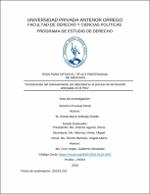Mostrar el registro sencillo del ítem
Incorporación del sobreseimiento por atipicidad en el proceso de terminación anticipada en el Perú
| dc.contributor.advisor | Cruz Vegas, Guillermo Alexander | |
| dc.contributor.author | Ambulay Rueda, Rosita María | |
| dc.creator | Ambulay Rueda, Rosita María | |
| dc.date.accessioned | 2023-12-19T22:08:16Z | |
| dc.date.available | 2023-12-19T22:08:16Z | |
| dc.date.issued | 2023 | |
| dc.identifier.uri | https://hdl.handle.net/20.500.12759/14931 | |
| dc.description.abstract | La presente investigación es desarrollada en el campo jurídico penal, ello generando expectativas de las incidencias que se manifiestan en el estadio del proceso, siendo titulada “Incorporación del sobreseimiento por atipicidad en el proceso de terminación anticipada en el Perú”, lo que conlleva a formularse la siguiente interrogante ¿Cuáles son los fundamentos jurídicos para regular expresamente el sobreseimiento por atipicidad en el proceso especial de terminación anticipada en el Perú? La investigación se justifica desde dos aristas, siendo la primera desde el punto de vista teórico, en el que se sostiene que no es posible que se pueda sobreseer un caso en audiencia de terminación anticipada; desde el punto de vista práctico, se infiere qué al sobreseer, los jueces de investigación preparatoria disminuyan su carga procesal, dado que no se tendrían que sustanciar nuevas audiencias para deducir excepciones de improcedencia de acción. Para que la investigación surta efectos se tiene como objetivo principal determinar cuáles son los fundamentos jurídicos para regular expresamente el sobreseimiento por a tipicidad en el proceso especial de terminación anticipada en el Perú ; siendo sus objetivos específicos cuatro: establecer alcances de la terminación anticipada a la luz de la doctrina y la jurisprudencia, analizar el control de legalidad que se realiza en la audiencia de terminación anticipada, analizar los principios de legalidad penal, de economía procesal y favorabilidad penal y, como último objetivo, proponer la incorporación del sobreseimiento por tipicidad en el proceso especial de terminación anticipada en el Perú. La hipótesis a la que responde la investigación es la siguiente: Los fundamentos jurídicos para regular expresamente el sobreseimiento por tipicidad en el proceso especial de terminación anticipada en el Perú son cuatro: el juez de investigación preparatoria se convierte en juez sentenciador, la atipicidad no varía en función de los elementos de convicción incorporados, se efectiviza el principio de economía procesal, evitaría la “pena del banquillo” y por último se fortalece el principio de legalidad el cual es acorde con el principio de favorabilidad penal | es_PE |
| dc.description.abstract | The present investigation is developed in the criminal legal field, generating expectations of the incidents that manifest in the stage of the process, being titled ““incorporation of dismissal due to atypicality in the early termination process in Peru““, which leads to the following question will be asked: What are the legal bases to expressly regulate the dismissal due to atypicality in the special early termination process in Peru? The investigation is justified from two angles, the first being from the theoretical point of view, which maintains that it is not possible for a case to be dismissed in an early termination hearing; From a practical point of view, it is inferred that by dismissing the case, the preparatory investigation judges reduce their procedural burden, given that new hearings would not have to be held to deduce exceptions of inadmissibility of action. For the investigation to be effective, its main objective is: to determine what the legal bases are to expressly regulate the dismissal due to typicality in the special process of early termination in Peru; Its specific objectives are four: establish the scope of early termination in light of doctrine and jurisprudence, analyze the legality control that is done at the hearing, early termination, analyze the principles of criminal legality, procedural economy and favorability criminal and as a final objective to propose the incorporation of dismissal due to typicity in the special process of early termination in Peru. The hypothesis to which the investigation responds: the legal bases to expressly regulate the dismissal due to typicality in the special process of early termination in Peru, is based on four: the preparatory investigation judge becomes a sentenced judge, the atypicality does not change Depending on the elements of conviction incorporated, the principle of procedural economy is implemented, it would avoid the “penalty of the bench” and finally strengthens the principle of legality; is in accordance with the principle of criminal favorability | es_PE |
| dc.description.uri | Tesis | es_PE |
| dc.format | application/pdf | es_PE |
| dc.language.iso | spa | es_PE |
| dc.publisher | Universidad Privada Antenor Orrego | es_PE |
| dc.relation.ispartofseries | T_DEREP_035 | |
| dc.rights | info:eu-repo/semantics/closedAccess | es_PE |
| dc.rights.uri | https://creativecommons.org/licenses/by/4.0/ | es_PE |
| dc.source | Universidad Privada Antenor Orrego | es_PE |
| dc.source | Repositorio Institucional - UPAO | es_PE |
| dc.subject | Sobreseimiento | es_PE |
| dc.subject | Atipicidad | es_PE |
| dc.title | Incorporación del sobreseimiento por atipicidad en el proceso de terminación anticipada en el Perú | es_PE |
| dc.type | info:eu-repo/semantics/bachelorThesis | es_PE |
| thesis.degree.level | Título Profesional | es_PE |
| thesis.degree.grantor | Universidad Privada Antenor Orrego. Facultad de Derecho y Ciencias Politicas | es_PE |
| thesis.degree.name | Abogado | es_PE |
| thesis.degree.discipline | Derecho | es_PE |
| dc.subject.ocde | https://purl.org/pe-repo/ocde/ford#5.05.00 | es_PE |
| renati.advisor.orcid | https://orcid.org/0000-0002-9119-5397 | es_PE |
| renati.author.dni | 71443358 | |
| renati.advisor.dni | 43414679 | |
| renati.type | https://purl.org/pe-repo/renati/type#tesis | es_PE |
| renati.level | https://purl.org/pe-repo/renati/level#tituloProfesional | es_PE |
| renati.discipline | 421016 | es_PE |
| renati.juror | Ortecho Aguirre, Rocío | |
| renati.juror | Albornoz Verde, Miguel. | |
| renati.juror | Rincón Martínez, Ángela María | |
| dc.publisher.country | PE | es_PE |
Ficheros en el ítem
Este ítem aparece en la(s) siguiente(s) colección(es)
-
Derecho [481]




